Welcome back to Preschool & Kindergarten Writing Lessons, a collaborative series from The Measured Mom and me. Instead of walking you through one writing lesson today, as I did with using dictation and sharing the pen, I’d like to just share a few tips for motivating reluctant writers.
Some kids LOVE to draw and write. Others LOATHE it. I would first and foremost say, please do not stress out about this with your younger children {or any child}. In my opinion and experience, motivating reluctant writers can be rewarding if you take a long, hard look at two things in particular: 1) Is it meaningful to my child? 2) What causes the frustration?
Is it Meaningful to My Child?
Hardly anything else in this world is more meaningful to a young child than her own name. If that is your child, start there. Even for the very young child (2-3 years old), you can start simple by writing her name on a piece of paper and letting her scribble over top of it. 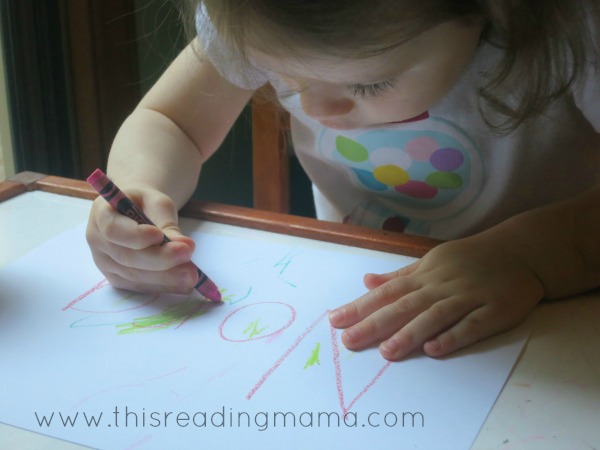 As she is scribbling, talk about the letters in her name. Sometimes, she may even try to mimic them in her own “writing”, as my 2 year old did below.
As she is scribbling, talk about the letters in her name. Sometimes, she may even try to mimic them in her own “writing”, as my 2 year old did below.
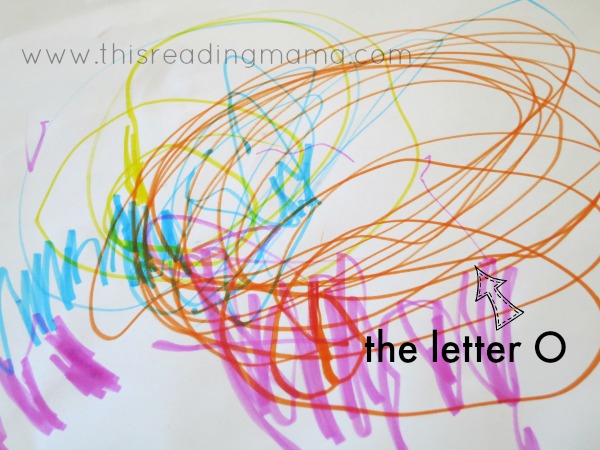 She has an o in her name, so it is very important to her. As she went round and round with the orange marker, she said, “o.” This writing had significant meaning to her. I celebrated that with her. Older, reluctant preschool writers may also enjoy name activities because it’s about them.
She has an o in her name, so it is very important to her. As she went round and round with the orange marker, she said, “o.” This writing had significant meaning to her. I celebrated that with her. Older, reluctant preschool writers may also enjoy name activities because it’s about them.
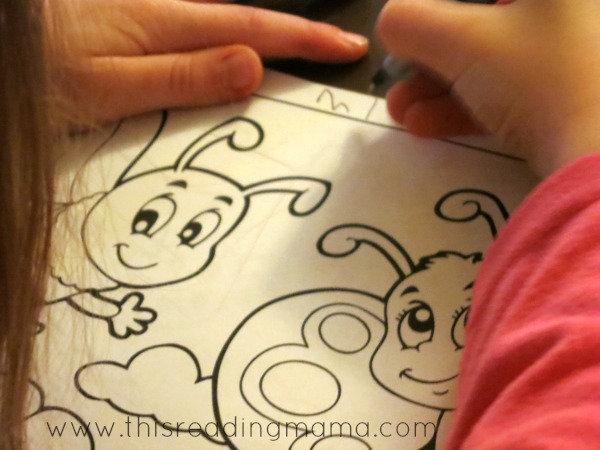 My two preschoolers and tot love the coloring pages from 1+1+1=1. As I printed them off just recently, my almost 4 year old was very motivated to write her own name on her papers so they would not be claimed by the other two kids! Talk about motivation to write your name. 😉
My two preschoolers and tot love the coloring pages from 1+1+1=1. As I printed them off just recently, my almost 4 year old was very motivated to write her own name on her papers so they would not be claimed by the other two kids! Talk about motivation to write your name. 😉
Another great place to start is with your child’s interests. Let him be the star of your writing time! Create texts together in which your child is the main character of a text you are writing. You can visit my guest post on No Time for Flash Cards to learn more about how I do this with my own kids, particularly my son.
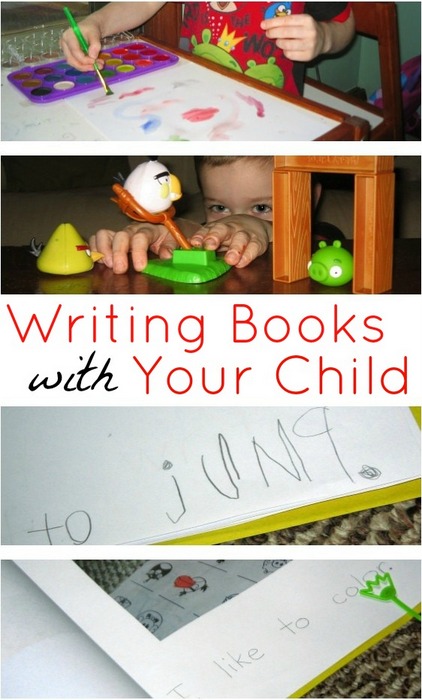 Does she love puppy dogs? As she draws a picture about puppy dogs, label her drawings to show her writing carries meaning. My son loves Angry Birds, so we write about them A LOT! Does your child enjoy being outside? Bring the paper and pencil outside. Write about the bugs he collects in his jar. Write on the driveway with sidewalk chalk together.
Does she love puppy dogs? As she draws a picture about puppy dogs, label her drawings to show her writing carries meaning. My son loves Angry Birds, so we write about them A LOT! Does your child enjoy being outside? Bring the paper and pencil outside. Write about the bugs he collects in his jar. Write on the driveway with sidewalk chalk together.
What Causes the Frustration?
Sometimes reluctant writers avoid writing because it frustrates them. And if we’re honest, it is human nature to avoid activities that cause us a lot of frustration. I have created a quick list of a few areas that could frustrate young writers. This list is not meant to be comprehensive, but it may give you a springboard for thinking through any area of writing that frustrates your reluctant writer.
1. We want to control instead of celebrate. Sometimes we get stuck in where we want them to be. We may push too hard to forget to simply appreciate what they have to offer in the stage of development they are in. This is easy to do if we begin to compare her abilities to another child (from the same family or from a friend). Literacy is a journey. It’s a process. We can’t push children through one stage to get to the next. Each stage needs to be developed and explored at the rate of that particular child.
2. She isn’t sure of her letters and/or letter sounds. Children who are not comfortable with their letters and letter sounds, particularly older preschoolers and Kindergartners, may avoid writing time. I would encourage you to continue working on the letters and letter sounds in playful and natural ways at the same time modeling and using dictation with your child. 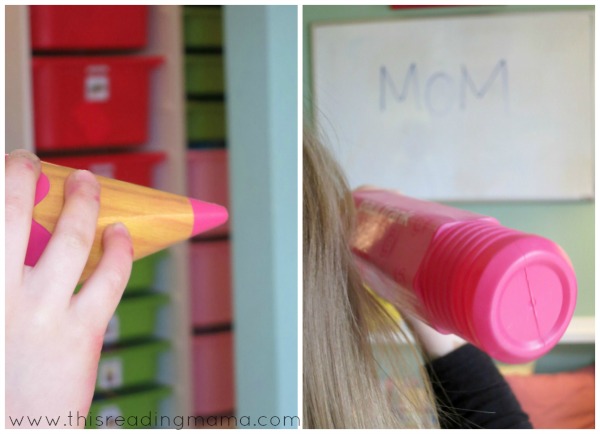
3. She may struggle with handwriting. Many young children still need to work on strengthening their hand muscles for writing. We can model writing for them, but if we expect them to stick to that very commonly used lined paper too early, it can be a source of frustration for them. Encourage your child to play with handwriting and use some effective ways to teach it.
4. She doesn’t know what to write about. Many children are creative in their play, but sometimes they tend to freeze up when it comes to writing. Maybe that’s because writing feels more formal or unnatural. The Measured Mom has a great journal prompt printable for young writers. You can also share the pen with them and write about a picture they just drew (which also keeps within their interests).
Final Thoughts when Working with Reluctant Writers
You can use all the latest motivating strategies and make writing super meaningful for your child and she may still turn her nose up to writing. You can help to support and alleviate frustration from writing, but your child may still refuse to do it. What do you do then?
1. FOLLOW THE LEAD OF THE CHILD. One of the biggest keys with young children is that you follow their lead as much as possible. Do not head into your writing time together with a rigid, pre-planned length of time or end goal. While it’s good to plan ahead, your child’s interest in the lesson should be your deciding factor as to where the lesson goes and how long the lesson lasts. 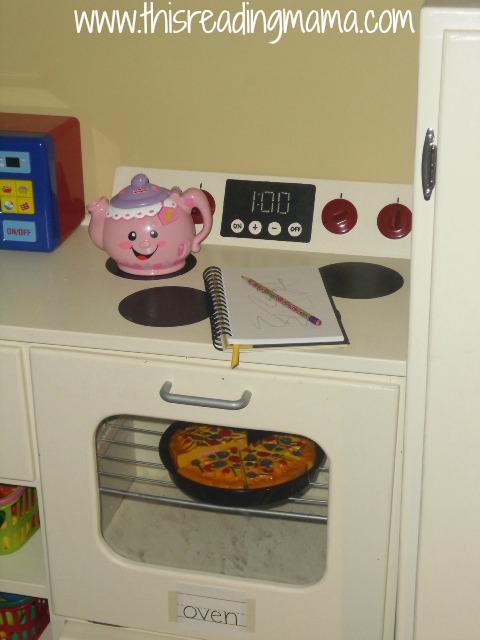
2. WEAVE WRITING IN NATURALLY. Don’t plan formal “writing lessons” , but weave writing in naturally all day long. Place a writing pad and pencil in places where she likes to play and let her do her own creative writing at her own pace. There are many ways to integrate writing into every day play. While this will take some intentional planning on your part, act natural. Take off that “teacher hat” and just explore writing in your every day together.
Follow This Reading Mama’s board My Name is… on Pinterest.
Follow This Reading Mama’s board Writing Ideas for Kids on Pinterest.
For more posts in our Preschool & Kindergarten series, click HERE or on the image below.
~Becky
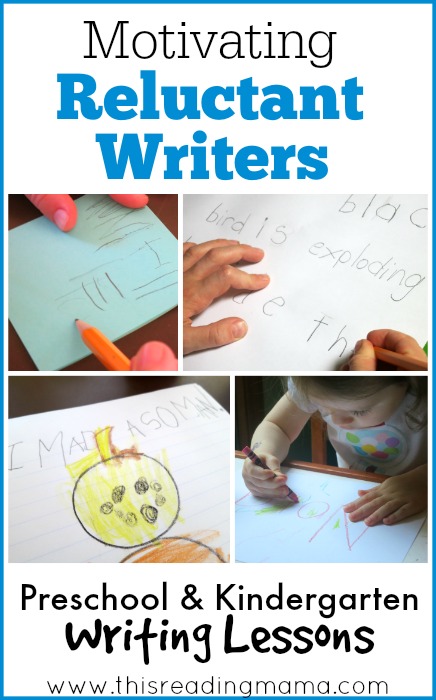
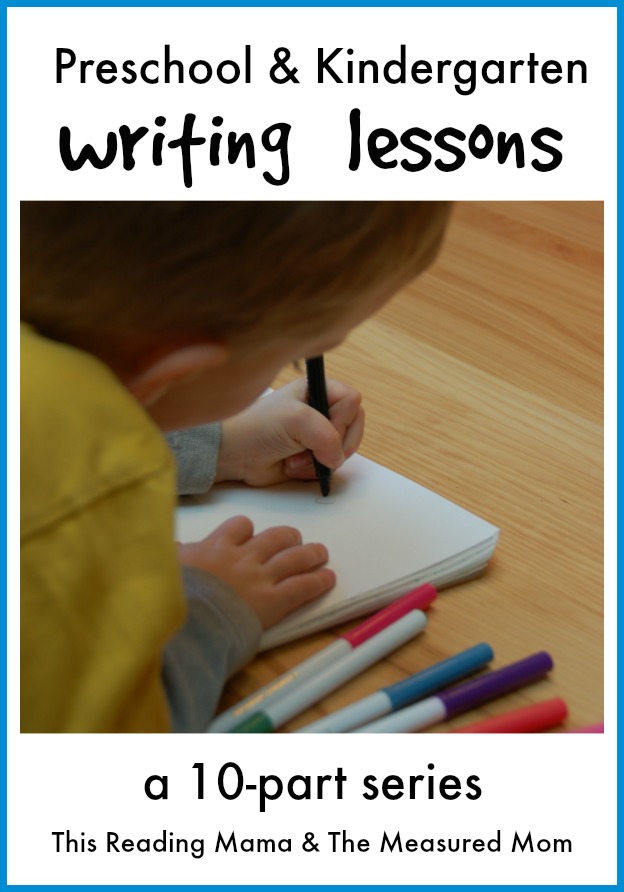
I think this is one of your best posts yet, Becky! I’ll definitely be referring parents to this one when they are having challenges writing with young children.
Thank you, Anna!
I really appreciate you sharing these posts. I think I’ve said that I taught Kindergarten, but it’s been completely different with my own son. I would say he has a reluctance for reading and writing (he’s 5.5). But he can do them. I am going to spend some fun time this summer with your ideas as we get ready for homeschool Kindergarten this fall.
Thank you for these posts. I have a 4 year old and will be homeschooling him in the fall (K). He has done very well, beginning to read, knows letters/sounds, but I am afraid his speech is messing up his writing of the sounds/correct letters. We have worked some here at home (stress-free) to help him pronounce his sounds correctly and there have been some improvements, but I was wondering if you could suggest any posts/blogs/programs, etc. to help with this. He’s made such good progress, I wanted to attempt to handle it here at home instead of going to outside help yet. (I have an elementary school degree, not speech pathology 🙂 Thanks in advance.
Where did you get the lined paper for your labels? (like on the play oven in the picture) I dont even know what to call it to search for it myself. Thanks!
It’s called sentence strip and I usually order mine on Amazon {affiliate}–> http://amzn.to/2cdkyEP